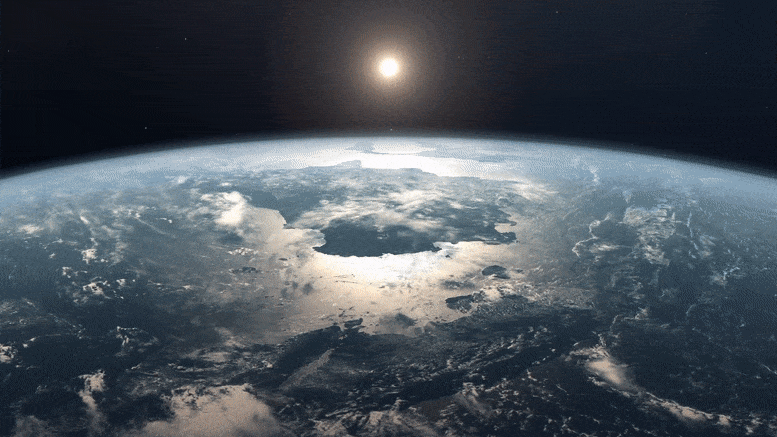正確な測定によると、2020 年以降、地球の自転が不思議なことに遅くなり、1 日が長くなったことが示されています。
原子時計と組み合わせた注意深い天文観測により、1 日の長さが突然長くなることが明らかになりました。 科学者はその理由を知りません。
これは、私たちの計時だけでなく、現代の生活を支配する GPS やその他の精密技術にも重大な影響を及ぼします。
自転軸を中心とした地球の自転は、過去数十年にわたって加速しています。 これが 1 日の長さを決定するため、この傾向が私たちの一日を短くしています。 実は2022年6月に 記録を打ち立てました! 半世紀ほどで最も短い日。
しかし、この記録にもかかわらず、2020年以降、この奇妙な一定の加速は減速に変わりました。 現在、再び日が長くなっており、これまでの理由は謎のままです.
携帯電話の時計は 1 日が正確に 24 時間であることを示していますが、地球が 1 サイクルを完了するのにかかる実際の時間は、わずかに異なる場合があります。 これらの変化は、何百万年もの期間にわたって発生することもあれば、ほぼ瞬時に発生することもあります。 たとえば、地震や嵐のイベントでさえ役割を果たすことができます。
今日、86,400 秒というマジック ナンバーは非常にまれであることがわかりました。
変化し続ける惑星
地球の自転は、月の潮汐に伴う摩擦の影響により、何百万年にもわたって減速してきました。 このプロセスにより、100 年ごとに 1 日の長さが約 2.3 ミリ秒長くなります。 数十億年前、アースデイが近づいていた 19時間.
過去2万年間、別のプロセスが反対方向に働き、地球の自転を加速させてきました。 最後の氷河期が終わると、極地の氷床が溶けて地表の圧力が下がり、地球のマントルが極に向かって着実に移動し始めました。
バレリーナが腕を自分の体 (回転軸) に向けると回転が速くなるのと同じように、このマントル質量が地球の軸に近づくにつれて、地球の回転速度が速くなります。 このプロセスは、1 世紀あたり毎日約 0.6 ミリ秒短縮されました。
何十年もの間、地球の内部と表面の関係も重要な役割を果たしてきました。 大規模な地震は、通常は少量ではありますが、1 日の長さを変える可能性があります。 たとえば、マグニチュード 8.9 の 2011 年東北地方太平洋沖地震では、地球の自転が比較的わずかに加速したと考えられています。 1.8マイクロ秒.
これらの大規模な変化とは別に、より短い期間では、天候と気候も地球の自転に重要な影響を及ぼし、両方向に違いが生じます。
2 か月ごとおよび 1 か月ごとの潮汐サイクルにより、質量が惑星の周りを移動し、1 日の長さがどちらの方向にも最大でミリ秒変動します。 潮の干満が見える 1 日の長さを最大 18.6 年間記録します。 私たちの大気の動きは特に強い影響を及ぼし、海流も役割を果たします。 季節の積雪、降雨、地下水の抽出は、状況をさらに変化させます。
なぜ地球は突然減速するのですか?
1960 年代以来、世界中の電波望遠鏡のオペレーターが技術を発明し始めたとき クエーサーなどの宇宙天体を同時に検出、地球の自転速度の非常に正確な推定値があります。
地球の自転を測定するための電波望遠鏡の使用には、クエーサーなどの電波源の観測が含まれます。 彼に起因する:[{” attribute=””>NASA Goddard
A comparison between these measurements and an atomic clock has revealed a seemingly ever-shortening length of day over the past few years.
But there’s a surprising reveal once we take away the rotation speed fluctuations we know happen due to the tides and seasonal effects. Despite Earth reaching its shortest day on June 29, 2022, the long-term trajectory seems to have shifted from shortening to lengthening since 2020. This change is unprecedented over the past 50 years.
The reason for this change is not clear. It could be due to changes in weather systems, with back-to-back La Niña events, although these have occurred before. It could be increased melting of the ice sheets, although those have not deviated hugely from their steady rate of melt in recent years. Could it be related to the huge volcano explosion in Tonga injecting huge amounts of water into the atmosphere? Probably not, given that occurred in January 2022.
Scientists have speculated this recent, mysterious change in the planet’s rotational speed is related to a phenomenon called the “Chandler wobble” – a small deviation in Earth’s rotation axis with a period of about 430 days. Observations from radio telescopes also show that the wobble has diminished in recent years. Perhaps the two are linked.
One final possibility, which we think is plausible, is that nothing specific has changed inside or around Earth. It could just be long-term tidal effects working in parallel with other periodic processes to produce a temporary change in Earth’s rotation rate.
Do we need a ‘negative leap second’?
Precisely understanding Earth’s rotation rate is crucial for a host of applications – navigation systems such as GPS wouldn’t work without it. Also, every few years timekeepers insert leap seconds into our official timescales to make sure they don’t drift out of sync with our planet.
If Earth were to shift to even longer days, we may need to incorporate a “negative leap second” – this would be unprecedented, and may break the internet.
The need for negative leap seconds is regarded as unlikely right now. For now, we can welcome the news that – at least for a while – we all have a few extra milliseconds each day.
Written by:
- Matt King – Director of the ARC Australian Centre for Excellence in Antarctic Science, University of Tasmania
- Christopher Watson – Senior Lecturer, School of Geography, Planning, and Spatial Sciences, University of Tasmania
This article was first published in The Conversation.

「音楽マニア。プロの問題解決者。読者。受賞歴のあるテレビ忍者。」







More Stories
ボーイングのスターライナーは数年遅れて歴史的な宇宙飛行士の打ち上げに向けて準備を進めている
ハッブル画像にはダンベル型星雲における恒星の共食いの証拠が含まれている可能性がある
科学者がタンパク質と脂肪のダンスを初めてビデオで撮影:ScienceAlert